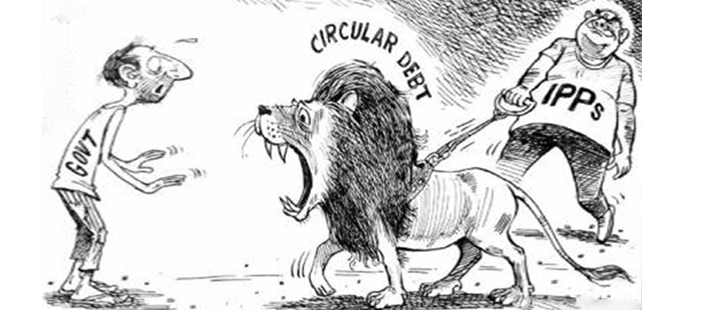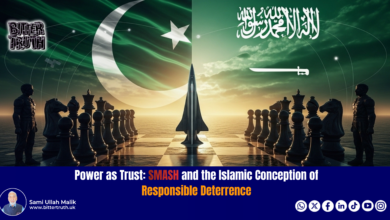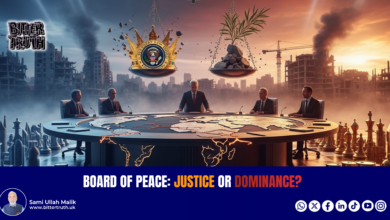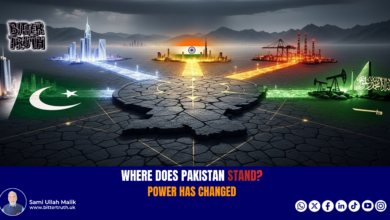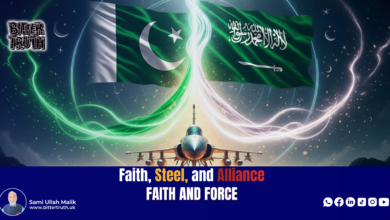Prepare for the Final Outcome
On August 14, 1947, when Pakistan emerged on the map as the world’s largest Muslim-majority state, Quaid-e-Azam Muhammad Ali Jinnah refused to appoint Lord Mountbatten as the first Governor-General. His refusal was not due to personal ambition but to signal to his nation and the world that British rule had ended, and the era of democracy had begun. This was a symbol of political independence. A year later, when the question arose whether Pakistan’s assets should remain with the Reserve Bank of India or if Pakistan should have its own bank, Jinnah decided that an independent Pakistan should have its own independent bank. Thus, he declared economic independence by announcing the establishment of the State Bank of Pakistan. During the inauguration of the first State Bank in Karachi, located in the historic building in Bolton Market, he stated that he did not want an economic system where the rich get richer, and the poor get poorer. He labelled the interest-based system as exploitative and urged economists and religious scholars to explore and research banking based on Islamic principles. He also emphasized ending exploitation and establishing a welfare state at the port of Chittagong in former East Pakistan.
Quaid-e-Azam set guiding principles for Pakistan’s foreign policy, stating that Pakistan sought friendly relations with every country on an equal basis but would continue to support oppressed nations. This was not mere political rhetoric, as he openly supported the freedom struggles of Palestine, South Africa, and Indonesia and took concrete steps to end racial discrimination and colonialism. If someone claims that he only supported the independence of Muslim countries, then why did he support South Africa, where the majority was non-Muslim?
Jinnah withdrew the army stationed in the tribal areas since the British era, stating that now our tribal brothers would guard our northwestern border. Little did he know that 60 years later, a self-proclaimed protector of Pakistan would re-station the army in those now-abandoned outposts, turned into ruins, at the behest of an American Pharaoh seated in the White House. This army deployment mirrored the British colonial masters’ efforts to tighten their grip on the freedom fighters’ settlements. The business of bribing selects tribal leaders to buy their loyalty reached its peak when the same dictator, to extend his illegitimate rule, allowed the American CIA to establish bases in the tribal areas in exchange for a few dollars.
This was not a new phenomenon. Previously, another self-styled or Western-styled Daughter of the East (West) had allowed the American FBI to establish offices on Pakistani soil. Is it not ironic that Quaid-e-Azam was unwilling to tolerate a British Governor-General and set a precedent by eliminating colonial remnants one by one, yet nearly half a century after his death, the rulers hosted foreign agents and spies of imperialism? The situation became so dire that puppet rulers, fearful of their own people, particularly the proud tribals, allowed foreign and Zionist and Crusader elements into the tribal areas to safeguard their usurped rule. Can anyone imagine a government feeling threatened by its own people, its religion, its beliefs, and its ideologies to the extent that it imports foreign agents and non-Islamic ideologies for self-preservation?
Some people reference Quaid-e-Azam’s speech of August 11 as if it was the first and only speech he ever made, dismissing all his other speeches. These individuals ignore his numerous statements in which he repeatedly and clearly declared that Pakistan would be an Islamic welfare state. He also clarified that Islam does not have a class like papacy or Brahmanism with any inherent right to state control. Those who claim that Quaid-e-Azam wanted a secular state should question whether he demanded Pakistan just so there would be two secular states in the subcontinent: one Pakistan and the other India. If Pakistan came into being as a result of the right to self-determination, then the element of Islam distinguishes it from India.
Who can deny the historical fact that the Muslims of the minority provinces in the subcontinent supported the demand for Pakistan out of a sense of unity? Thus, to claim that the demand for Pakistan was driven by economic motives is entirely incorrect, as the Muslims of the minority provinces had no economic benefits to expect from the creation of Pakistan. They ended up being hostages to the Hindu majority. However, I cannot speak for those landlords and capitalists who switched allegiance overnight from the Unionist Party to the ruling Muslim League to preserve their privileges. Nor will I comment on those self-interested individuals who migrated from India to Pakistan in search of property, wealth, and status.
Many leaders of a linguistic party in Pakistan were still residing in India at the time of Pakistan’s creation, assessing the economic and political developments of the new country. They sold their businesses and other properties at good prices and took full advantage of opportunities in Pakistan. Through the bureaucracy, they took control of Pakistan’s administrative and important national institutions, much like the black British rulers, and now openly plunder the country while shamelessly citing the sacrifices of their elders for Pakistan. The motivations of these classes were undoubtedly economic, but millions of people living in Pakistan participated in the struggle for Pakistan out of an Islamic spirit. Many were killed, many women lost their honor, but their determination did not waver even a bit.
If this was not a spirit of faith, then what was it? It was backed by the tradition of Karbala, and its oxygen was the ideology of the Khilafat Movement. Did the Muslim masses make such sacrifices for a homeland only to see it fall under American dominance? Did Quaid-e-Azam withdraw Pakistan’s assets from the “Reserve Bank of India” to place them in the State Bank of Pakistan so that a “country manager” of Citibank could be imported and made the Prime Minister, selling national assets at throwaway prices and then disappearing into the night after pocketing commissions? And when the country was finally freed from such rulers, the State Bank was handed over to the IMF to extricate the nation from slavery.
Did Quaid-e-Azam support the right to self-determination in Kashmir so that we, through our failed foreign policy, could easily hand over Pakistan’s lifeline to India? Now, India is settling millions of Hindus in Kashmir under a conspiracy to reduce the Muslim population and is organizing investment conferences in the disputed Kashmir to further legitimize its illegal occupation.
Has there been a secret understanding on all contentious issues with India that the Kashmir issue has been removed from our priorities? Just six years after Quaid-e-Azam’s death, the bureaucracy allowed the United States to establish military bases on our soil from where espionage flights against the Soviet Union were conducted, leading Russia to consider Pakistan an enemy and using its veto power to nullify the resolution for a plebiscite in Kashmir. Similarly, the resolution for the withdrawal of troops from East Pakistan was also nullified, giving the Indian military a full opportunity to occupy East Pakistan. Seven decades later, efforts have begun to restore relations with Russia, but it has entangled itself in an endless war with its neighbour Azerbaijan, putting pressure on Pakistan once again.
Quaid-e-Azam said that there would be democracy in the country, and now after the 18th amendment, every province has internal financial autonomy. However, his successors refused to grant East Pakistan representation based on population ratio, leading to the separation of the eastern wing. In this country, a commando extended his rule by complying with American Condoleezza Rice’s orders and, in his military uniform, made a deal with Benazir Bhutto in Dubai with General Kayani’s accompaniment, giving her immunity from all corruption charges and inviting her back to the country. Thousands of other national criminals also benefited, getting amnesty for all their crimes, but despite these concessions, the commando couldn’t save his rule, and those who plundered the national wealth once again began devouring it as if it were their birthright. This hollowed out the foundations of Pakistan, and agents of colonialism (God forbid) started discussing dates for its disintegration and even drawing maps with their devilish minds. These malevolent individuals, blinded by their hatred for Pakistan, have openly stirred up armed insurgency in tribal areas and Baluchistan with India’s help, forcing our forces to sacrifice their lives daily to counter this threat.
Our misfortune has not ended yet. The nation sacrificed their lives and property for an independent judiciary and then pinned their hopes on Imran Khan as their saviour, investing all their energies in his leadership. However, during his nearly four-year rule, Imran Khan took a U-turn on every promise made to the nation, calling it political maturity while deceiving the nation. When his policies led the country into the clutches of international financial institutions with strict conditions, plunging it into a storm of inflation, he blamed the United States during the opposition’s no-confidence motion, accusing all opponents of being American agents and pleading with the nation to defend him. Simultaneously, he launched fierce attacks on a key national institution, leading to an unprecedented campaign against the military, with social media pouring fuel on the fire, making the task of enemies plotting against the country’s security much easier.
The same judiciary that once granted Imran Khan the certificate of honesty and integrity has now, by its own orders, placed him behind bars. During his tenure, Imran Khan frequently waved an American letter at public gatherings, blaming the U.S. for various issues. Yet, at the same time, his party’s senior member Shireen Mazari expressed her outrage on Twitter over the U.S. ambassador’s visit to the Torkham border in a helicopter. Hours later, the Chief Minister of Khyber Pakhtunkhwa and other provincial ministers met the same U.S. ambassador, thanking him for completing over 20 projects in their province through USAID and accepting a gift of 36 vehicles from the U.S. This double standard was witnessed by the entire nation.
Today, once again in Pakistan, there is a storm of defamation against each other in all the political parties, while the country’s economic and political crisis has forced the nation to think that now it is necessary to get rid of all these experienced politicians. To do this, the system should be brought in this country with new honest people which will change the destiny of this country. Don’t go away, just look back and see on what conditions a dangerous project like “IPPs” was brought to Pakistan and then every successive ruler and politician looted trillions of rupees from the country and now. Even the last drop of blood is being squeezed from the body of the people.
We have been driven to a point where we lack the funds even to pay salaries, with all our assets already mortgaged to foreign financial institutions. There are rumours that the national airline, PIA, has been effectively destroyed. One of Imran Khan’s ministers, Sarwar Khan, stood in the assembly and made a false and outrageous claim that led to global restrictions on our aircraft operations. Later, the relevant international body cleared all Pakistani pilots of these allegations, while in the neighboring country, 346 pilot licenses were cancelled, yet their airlines continue to operate.
Shourya Doval, son of Ajit Doval and affiliated with the BJP, co-owns Torch Investment Company with Pakistani businessman Syed Ali Abbas. This company, which has significant shareholdings in Pakistan’s e-commerce sector, including Jazz Cash, Easy Paisa, and the FinTech ecosystem, as well as in the Securities and Exchange Commission of Pakistan and Pakistan Telecommunication, is embroiled in controversies. Torch Investment Company, which also holds a stake in the Laxon Group (one of the primary organizations being McDonald’s), is involved in efforts to acquire shareholding in PIA through collaboration with individuals like Syed Ali Abbas, under the guise of potential privatization of PIA, raising concerns about transparency, accountability, and the impact on Pakistan’s national interests. Will our judiciary muster the courage to take Suo motu notice of such a massive national loss?
Currently, the entire elite class of the country has become a burden on the national treasury, enjoying luxuries under the guise of privileges while turning a blind eye to the nation’s destruction. To save the country, the public themselves must urgently step forward and utilize all their energies to bring these betrayers and their foreign masters to a final reckoning. Additionally, immediate and wartime legislation is required to recover the looted wealth of the nation.

